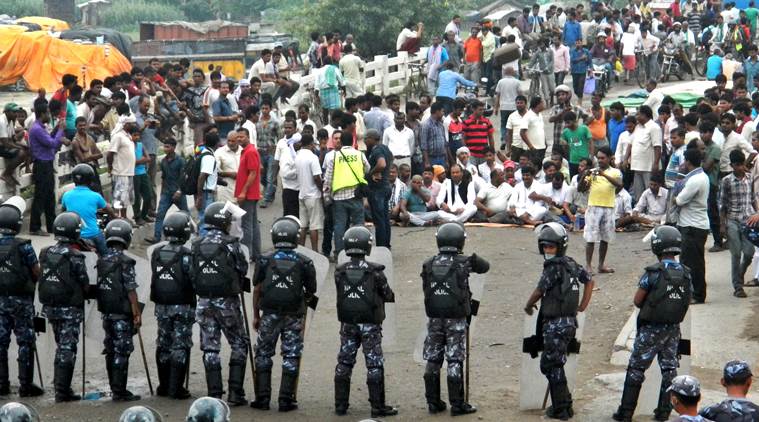As 'Indian' Blockade Continues, Nepal Moves Close To China
Policemen and protesters

NEW DELHI: As India’s unofficial blockade on Nepal continues, reports indicate that Nepal is preparing to sign a trade and transit treaty with China.
The Kathmandu Post notes, “The Foreign Ministry has announced the visit of Deputy Prime Minister and Minister for Foreign Affairs Kamal Thapa to China on Sunday at the invitation of the Chinese government. In Beijing, Thapa will meet his Chinese counterpart Yang Yi and senior Chinese political leaders and officials. An official meeting of the foreign ministers has been scheduled for Thursday. If China consents, Nepal will have access to Chinese ports for export and import to a third country. The nearest Chinese port from Nepal is Shanghai. If the two neighbours sign the pact, Nepal’s dependency on India for trade with the rest of the world will end.”
The report adds that Nepal is also seeking a Free Trade Agreement with China. Priority will be attached to duty free access for Nepali exports to China, it says. Further, the visit will also include on its agenda a government-to-government deal for importing fuel from China. The two sides are expected to settle issues related to tax, transportation and logistics, the article adds.
Meanwhile, protests by the Madhesis continue along the India-Nepal border, with the unrest being India’s reasoning for the disruption in trade and transit. At the time of writing, a 17 year old student was killed and four people injured as supporters of the United Democratic Madhes Front (UDMF) clashes with the police at Gaur.
The latest round of violence comes as the the main opposition party Nepali Congress and the agitating group agreed to quickly resolve the current political crisis with representatives of the UDMF and NC meeting at NC president Sushil Koirala’s residence at Maharjgunj on Saturday.
Relations between India and Pakistan remain tense, with Indian Ambassador to Nepal Ranjit Rae expressing concern over the growing “anti India” sentiment in Nepal. "We sense that this is being used for certain objective -- political or otherwise,” Rae said, adding, “There is a section which is encouraging anti-India sentiment as it helps them in some way.”
The dip in relations is also evinced by the fact that last month, in a first, India told a meeting of the UN Human Rights Council that it was “concerned” over “lack of political progress” and incidents of “violence, extra-judicial killings and ethnic discrimination” in Nepal. At the Geneva meeting of the UNHRC on Nepal’s Universal Periodic Review, India’s Acting Permanent Representative to the UN, B N Reddy said: “The people of Nepal, having endured a devastating earthquake in April 2015, are facing another tough challenge during the ongoing political transition. Violence and instability in parts of Nepal has worsened in the run-up to and after the adoption of Nepal’s Constitution in September 2015. Over 45 persons died, mostly civilians, and hundreds injured. Firings, which had ceased just after the adoption of the Constitution, have reoccurred. We are concerned over the lack of political progress.”
India-Nepal ties have plummeted since the adoption of Nepal’s new constitution, in which it declared itself a secular state instead of a Hindu rashtra. This has reportedly been a major point of contention for Nepal’s closest ally, India, with reports indicating that the Indian government had levelled pressure on Nepal to declare itself a Hindu Rashtra.
The Indian government, on its part, maintains that its opposition to the new constitution is not to do with Nepal’s status as a Hindu nation, but linked to security concerns as Madhesis are protesting the new constitution in the Terai region of Nepal bordering India.
The Madhesis state that the new constitution will leave them under represented in Parliament, and have been staging protests for the last month. Violent clashes have led to almost 40 deaths.
In connection with the above, India reportedly imposed an ‘unofficial’ blockade at the Birgunj trade checkpoint, effectively cutting off vital supplies -- including petroleum products -- to Nepal.
India denied imposing a blockade, saying that the restrictions on movement of goods and supplies was linked to security concerns over the violence led by the Madhesis along the border.
Nepal, however, maintained that India had imposed a blockade. "Continued obstruction at border customs points and the IOC halting supply of petroleum products have created an abnormal situation in fuel supply," Nepal’s home ministry said in a statement.
The fact that the pressure that India probably hoped to level through the blockade has backfired was cemented by Nepal signing an agreement with China on supply of petroleum products to alleviate shortages.
"Nepal Oil Corporation (NOC) and China National United Fuel Corporation formalized a long-term commercial agreement in Beijing on Wednesday afternoon," a senior Nepali bureaucrat told Times of India. Under the agreement, the bureaucrat added, China will supply fuel at international rates, which Kathmandu might find cheaper than its imports from India. To begin with, China will fulfill at least a third of Nepal's requirements.
Nepal’s agreement with China effectively India’s historic status of Nepal’s sole fuel provider.



